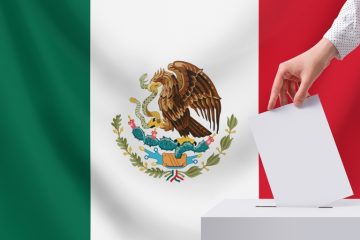
Mexico’s President-elect Claudia Sheinbaum and migration: What will change and what will remain the same?
On October 1st, Claudia Sheinbaum will be sworn in as the first female president in Mexico’s history. As president, Sheinbaum will have to address pressing issues that require domestic, bilateral, and regional cooperation, among them transit migration. Since taking office in 2018, Mexico’s current President Andrés Manuel López Obrador (AMLO) has promised to adopt a human rights approach to address transit migration, but throughout his presidency he has continued to implement policies that have further militarised migration routes and criminalised migrants seeking to reach the US, pushing many to take more dangerous routes. In 2023, the International Organization for Migration (IOM) found the US-Mexico border to be the world’s deadliest migration land route for migrants. Given the unprecedented levels of …

Can Mexicans predict the presidential election in June?
In most democracies, opinion polls routinely ask voters how they intend to vote in an upcoming election. The press and other media use these poll results, specifically the aggregated percentage measures of voting intentions for candidate X, to indicate the likelihood of that candidate winning. While this approach is a practical means of predicting election outcomes, there is a lesser-known survey item that can also serve this purpose, namely questions about voter expectations rather than voter intentions. For example, “Who do you think will win?” rather than “Who are you going to vote for?” A growing body of research has examined the accuracy of voter expectations relative to voter intentions. The most comprehensive work on the subject, looking at more …
OxPol Blogcast Episode 4: Mexico’s Midterm Election
Welcome to the OxPol Blogcast, a podcast where we will be sharing research, analysis, and experiences from members of the University of Oxford’s Department of Politics and International Relations. On each, episode we will talk to a guest about a piece they’ve written for the OxPol Blog. Then, we’ll discuss their larger research agenda, their insights on conducting political science, and their time at Oxford. On this episode of the OxPol BlogCast, host Chase Harrison talks to DPhil student Javier Pérez Sandoval about Mexico’s upcoming midterm election, theories of voter choices, and analysing democracy at the subnational level. Read the original blog post here: https://blog.politics.ox.ac.uk/a-return-to-the-right-for-mexico-foucaults-pendulum-and-missed-political-opportunities/ Views expressed on this podcasts are those of the guests alone and are not representative of …
A Return to the Right for Mexico? Foucault’s Pendulum and Missed Political Opportunities
In June 2021, amidst the COVID-19 pandemic, Mexico will face what is bound to be one of the most complex mid-term elections the country has seen in the last two decades. At stake is control of 15 (out of 32) governorships, 30 state legislatures, 1,900 municipalities and a complete renewal of the Lower Chamber of Congress. The outcome will clearly be either a punishment or a reward for the leftist administration of Andrés Manuel López Obrador (AMLO) and the ballots cast this summer will undoubtedly make or break the second half of his presidency. The extent to which the COVID-shock has impacted individual political preferences in Mexico remains unclear. Looking at the most recent available data to conduct an exploratory …
Biden, López Obrador and the politics of migration: a return to the status quo?
Joe Biden’s presidential victory has brought temporary relief for many undocumented and mixed-status families in the US. Biden promised to reverse several of Trump’s executive orders on immigration and refugee policy within his first 100 days in office including reinstating the Deferred Action for Childhood Arrivals (DACA) program, ending the Migrant Protection Protocols (MPP) also known as “Remain in Mexico,” and creating a “road map” to citizenship for the approximate 10.5 million undocumented immigrants in the US. While Biden’s immigration agenda contains federal and local level priorities, little emphasis has yet been placed on the bilateral scale with the US’s southern neighbour, Mexico. Yet, bilateral immigration negotiations should be a priority for administrations on both sides of the border. In …
Will Brazil’s Past be Mexico’s Future?
For the last two decades, observers and scholars of Latin American politics have wondered about the electoral fate of the left. Some analysts in particular have highlighted how the end of the ‘Pink-tide’ precipitated the comeback of right-of-centre governments across the region. But in this regard, Mexico has been running in dissonance to its regional counterparts. The right-of-centre parties Partido Acción Nacional (PAN) and then the Partido Revolucionario Institucional (PRI) occupied the executive office from 2000 to 2018 while most Latin American countries turned to either a radical or a reformist left. Now, however, left-of-centre Andres Manuel López Obrador (AMLO) and his National Regeneration Movement (MORENA) hold the Mexican presidency. To delineate what the future might hold for AMLO, we can look to the previous experience of the …
A Battle for Morena’s Soul: Mexico’s Ruling Party’s Chaotic Leadership Election
One of the great surprises of the 2018 Mexican election was not the largely predicted landslide victory of Andrés Manuel López Obrador but the commanding performance of his political party, Morena. In just its second federal election, Morena won a vast legislative majority in the federal Congress and control of state governments across the country. The party was a relative newcomer on the scene— it was founded just 5 years prior as a civic project of the left. However, in the run-up to the 2018 election, the party ballooned in size, absorbing members from across the political spectrum. Still, Morena was able to present itself as a fairly unified front in the 2018 election. However, in the past few months, the once latent internal …

AMLO’s National Guard: More of the Same?
Mexico’s new national guard has been in the news recently because it plays a critical role stemming the flow of Central American migrants. However, it remains “a work in progress,” and has been the subject of severe criticism since its inception. Despite making promises to demilitarize Mexico during his campaign, President Andrés Manuel López Obrador is going forward with continuing to rely on militarized public security under a different name. The Plan Nacional de Paz y Seguridad 2018-2024 – his plan to bring about ‘peace and security,’ entails the creation of a Guardia Nacional (national guard). Of course, improving public security is of vital importance, because the security situation in Mexico is dire: Last year set a new record for …








